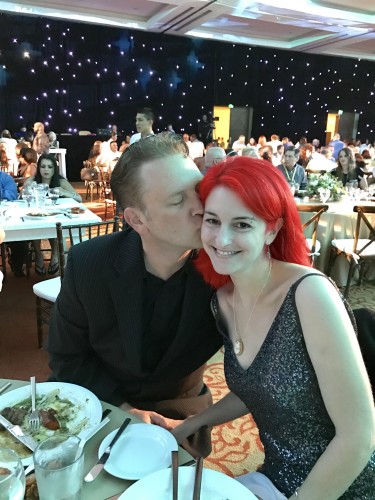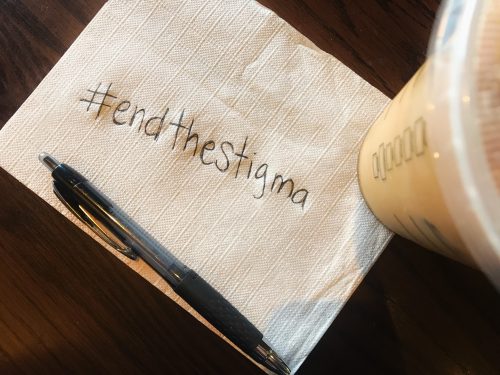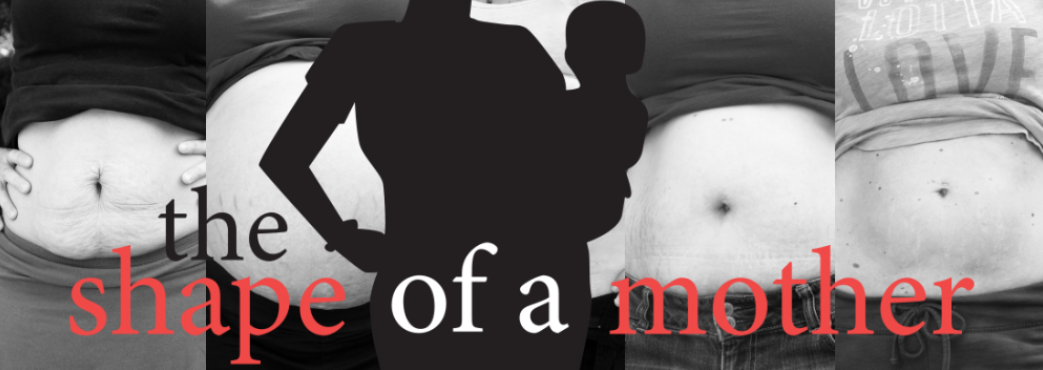Your Age: 36
Number of pregnancies and births: 3 pregnancies. 1 birth, 2 abortions
The age of your children: Son born September of 2008. Abortion in 1997 at eight weeks and in 2009 at four.
I have always had depression and anxiety, I have no memory of a time when they weren’t present; according to my family I was an anxious infant. I began seeing a psychologist at around age six. After much pleading, and at the recommendation of my psychologist, my parents finally agreed to let me take psychiatric medication at seventeen. It was like the world opened up. Suddenly things that had seemed difficult were attainable. I remember being excited to drive to the house of a friend who lived an hour away. Goddamn, that sounds pathetic.
Post medication I wouldn’t describe myself as being ‘fixed’ but I was certainly far more functional. I could hold down a job and was able to live on my own.
When I was twenty-seven my husband and I decided to have a baby and I went off my medication to do so. I thought I’d be okay.
The only reason I didn’t kill myself when I was pregnant was because I knew I would fuck it up, kill my baby, lose my nerve and then have to live with that the rest of my life. I was very aware of the point in my pregnancy when having an abortion would no longer be legal and up until that point there was always the voice in the back of my mind that if I needed to I could still back out. I wanted a baby very much, I wanted this baby very much, but I was catastrophically depressed. I had vivid dreams where I killed myself and/or my child.
And he was my child. From the very first moment I found out I was pregnant I wanted him, I loved him. I wanted him before he was even conceived.
I thought things would be better after I gave birth, but I was wrong. He was a month early. It’s possible he was early because I was so depressed that I was barely able to eat and he wasn’t getting the proper nutrients. Who knows.
I was hospitalized for the first time when he was eight weeks old. After much deliberation, and many conversations with friends, family and health professionals, I signed myself in voluntarily because I wasn’t able to function. I was unable to sleep, even when my son was sleeping, and at the time that I signed myself in I hadn’t slept for approximately two weeks and was starting to hallucinate.
While I was in the hospital I was able to see my son once daily in a cold, brightly lit conference room that was one floor below the psych ward. I brought a small manual breast pump with me to try to keep up my milk supply and pumped several times a day and throughout the night. Because of the medication I was given I had to throw most of it away.
I was released after a week.
When he was twelve weeks old I was readmitted after taking an overdose of a Ativan. I blacked out in the emergency room as they were placing an IV catheter.
My first memory after passing out is standing naked in front of the mirror in the bathroom off my hospital room and seeing my milk swollen breasts covered in the sticky residue from the EKG leads. I was emaciated because I had been fighting to breastfeed in spite of not being able to eat. To be honest I’m not even sure if that memory is true.
I have been hospitalized since then.
But what I want to talk about, what I feel doesn’t get talked about enough, are the pregnancies I chose not to carry to term.
The first time I got pregnant I was seventeen and about a month away from beginning my senior year. I had just started taking medication for my depression and anxiety. My boyfriend (A) and I had been together for about six months and things were great. We had both had prior sexual relationships but we were each other’s first loves. We were pretty careful over all but there was one night where we got carried away. He didn’t ejaculate inside me. Didn’t even get close. But there was penetration without a condom and apparently that was enough.
When my period was late I took a test. The line was very faint but it was there. A and I looked at it and tried to convince ourselves otherwise but there was no denying it. I told my mother and she took me to the doctor. The nurse congratulated me and calculated my due date as I sobbed.
When I went to A’s house after the doctor his first words to me after I told him the home test had been accurate were, “You’re going to have an abortion, right?”
I was always pro-choice. I always had in my mind that if the situation arose I would have an abortion without a second thought. I would tell every new partner that he had a choice: to know or to not know. A was the one who was pro-life and suddenly he didn’t want to discuss it. I wanted to discuss it. I didn’t think I wanted a baby but I loved A and there was a part of me that imagined the three of us together as a family.
It was 1997, RU-486 wasn’t available, and the clinic told me that I would have to wait until I was eight weeks along to have a surgical abortion.
We did end up talking about it, A and I. We did lots of talking in the four weeks between when I found out I was pregnant and my appointment at the clinic. I had been unsure that I ever wanted to have a child but during that four weeks I realized that I did. Someday.
I had made the appointment for a Friday so that I would have the weekend to recover before going back to school. The clinic was 45 minutes away from where we lived and it was to be an all day affair. We arrived in the morning and were shuffled from room to room. I filled out endless amounts of paperwork, took a pregnancy test, had my blood type checked (they screwed it up*), saw a counselor, and had an ultrasound. Between each step we waited in rooms with other women who were either with a partner or friend. No one talked much or made eye contact.
A was in the room with me for the ultrasound. I asked to see it and the technician seemed a little uncomfortable. She left it up on the screen when she stepped out of the room for a moment. We both looked, A and I. The image was still and grainy.**
After hours of waiting and paperwork and testing and talking and somehow even more waiting they led me away from A and into the secure part of the clinic.
They took my vitals, gave me a key on a plastic bungee to put around my wrist like at a public pool and directed me to a bathroom with lockers. I took off my clothes, stowed them in the locker corresponding with my key, put on a hospital gown from the pile on the shelf and went to meet the nurse.
I was taken to a small room and given a sedative.
The nurse was kind, she stroked my forehead and said it would be okay. The doctor introduced himself but all I remember of him is how the powder from his gloves had collected in the creases of his hands which I noticed when he shook mine. I remember looking up at the ceiling and seeing fall leaves through a skylight, but I don’t think that’s right. I don’t think that’s a true memory because I think the room was in the basement. I don’t know if the doctor is a true memory either.
I do know that I felt a pinch deep inside, and in that split second I thought I could still get up and leave and have it not happen. But I didn’t leave and then there was only the gentle hum of the machine.
When it was over the nurse lead me to a room full of reclining chairs set in a half circle facing a television playing an endless loop of aftercare instructions.
Upstairs everyone had been looking at everyone else out of the corners of their eyes. Down here women were looking at each other directly, telling their stories and asking questions. One woman talked about her young daughter and how she couldn’t possibly support another child.
The first time they had me get up to leave I nearly passed out in the bathroom. I tried to wipe the blood off but it just seemed like there was more where it came from no matter what I did. I started to get dizzy and then went for help soaking the tops of my socks in blood as I shuffled down the hall to the nurse’s station.
The second time I got up I felt much better and was able to get cleaned and dressed quickly. I met with a nurse about aftercare and birth control and then was brought out of the secure area. A was waiting for me on the front steps of the clinic smoking a cigarette. He drove us back to my mom’s house and we watched the movies we’d rented earlier in the week.
A and I were together for a little over a year all told. Approximately six months before and six months after the pregnancy, maybe a little more or less in either direction. He broke up with me and it was all the more painful because I had pictured having a child with him someday. We stayed in touch for a few years, he went into the marines and I went to college, and somewhere we lost touch.
There were times when I thought what if. Absolutely. I would sit in the tiny little one bedroom apartment that I loved in the shitty part of town and wonder for a moment where on earth I’d fit a child into my life. The answer was always no where.
Regret isn’t the word. Ambivalent relief is closer.
Eleven years after my first abortion, while I was pregnant with my son, A got back in touch through a mutual friend. He apologized for ‘making’ me have the abortion and for leaving. He said he thought we could have made it work and that he had made a mistake. We’ve been in touch regularly in the past eight years and our interactions are always positive. He has a four year old son with an ex girlfriend and his current girlfriend has two children. He’s a great guy and I value the relationship that we have.
The third time I found out I was pregnant my son was a year old. I had planned to get an IUD or Essure when he was six weeks old but that had been derailed by my experience with postpartum depression and previously undiagnosed bipolar disorder. I had actually made an appointment with an OBGYN (my son was delivered by a midwife) for birth control but got lost on the way there and then my son began to cry because he was hungry. I had a panic attack and went home. I begged my husband to get a vasectomy but he would just say that I was going to change my mind and want another baby someday.
We used condoms, although clearly not compliantly, and I took Plan B on two occasions when a condom slipped.
I’m not sure when exactly I got pregnant but I took a test two days before my son’s first birthday. I said to my husband, “Fuck, this thing says I’m pregnant.” It was four in the morning when I took the test and as soon as the nearest clinic opened I called to make an appointment.
It was 2009 and RU-486 was available so I was able to make an appointment for the next day instead of having to wait until I was farther along.
My husband refused to go with me to the clinic because he was angry with me. He wanted me to continue the pregnancy in spite of the danger to my health. Our roommate drove me instead.
Even though it happened more recently the second time is less memorable than the first. I know I filled out paperwork, had a physical and blood work, but not much sticks out. This time there wasn’t much to see on the ultrasound, just the amniotic sac, since I was only about four weeks along. I asked for a printout of the ultrasound and it’s in a box along with the things I saved from my son’s first birthday. This time when they offered me RhoGam I declined. I told them that if it were just a case of bad timing I would continue the pregnancy, but it wasn’t just bad timing, I can never have another child.
I met with a counselor and it turned out that she had worked at the clinic I had gone to the first time during the time I had gone there. It was twelve years later and we were halfway across the country from where we’d been but here we were.
I cried as I talked to her and she commented that I seemed really angry. I hadn’t realized that I was until she pointed it out. I was angry at myself for not having been more careful – I still don’t know where we screwed up – and I was very angry at my husband for not listening to me when I told him I didn’t want and couldn’t have any more children.
They gave me the mifepristone to swallow there at the clinic and the misoprostol to take home with me to insert into my vagina the next day. They also gave me a prescription for Vicodan before sending me home.
On my son’s first birthday I inserted the misoprostol tablets, took a Vicodan, and waited. It didn’t hurt much. The bleeding picked up considerably in the middle of the night and when I sat down on the toilet there was so much blood pouring out so quickly that it sounded like I was urinating. I had planned on trying to look for it so that I could see it but I just didn’t have the energy to turn on the lights, let alone fish around in the toilet for a tiny lump of flesh.
The second time was much easier. I knew what it was like to have an abortion and I knew what it was like to have a child. The choice was pretty clear. The pill felt much less invasive as well since I was able to be in my own home. I didn’t experience much discomfort, the Vicodan made me feel relaxed and I mostly slept.
I would say that both of my abortion experiences were pretty positive given the circumstances. I didn’t have much pain either time, nor do I have regrets. I feel bad for A that he ultimately wasn’t happy, I feel bad for my husband, who wanted more children, and for my son who wanted siblings, but for myself I feel thankful that abortion was an option available to me.
I’ve started talking about my abortions more frequently and openly in the hopes that if I put a real live human face on it I might be able to change some minds. I’d found myself getting irritated that there are so many high profile women who are willing to say they’re pro choice and yet so few have come forward with their own stories, but then I realized I was doing a much smaller version of the same thing. Arguing in hypotheticals isn’t as effective as using particulars. If I can sit down with my pro life friends and tell them about my experiences maybe next time they go to vote they’ll think of me, an actual woman they know and like, and vote differently. It’s important that we keep abortion safe, legal, affordable, and accessible because, as we’ve learned over and over, making it illegal doesn’t stop it.
So I’ve started talking, and I hope more women do to.




